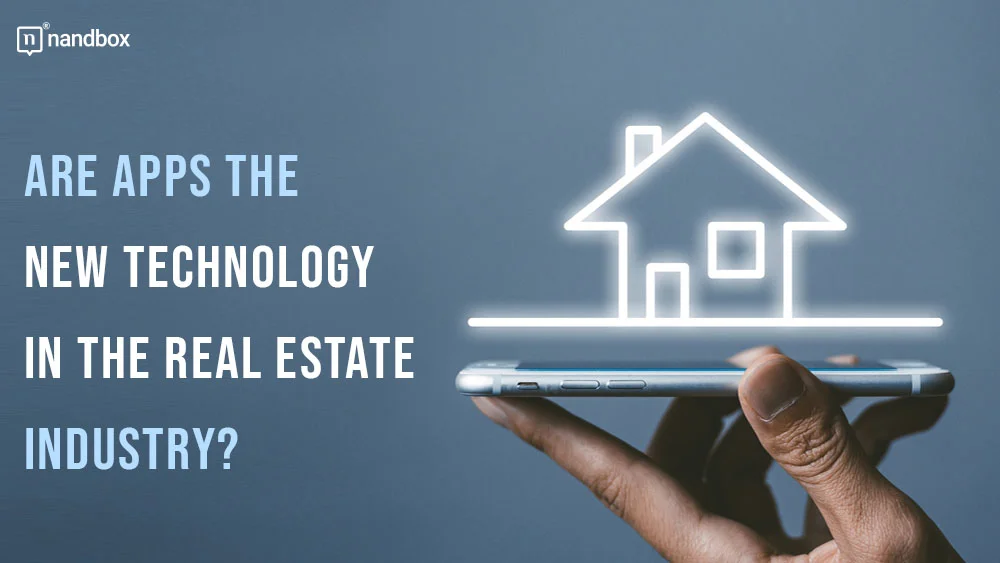According to Maslow’s hierarchy of needs, finding a place to stay and live is involved in psychological needs. To be more clear, it is something that we always need to survive and can’t simply live without. But that was way, way ago. Day by day, human needs change, and the way that residential places have turned from psychological necessities to survive to things we use for self-actualization in terms of self-image and money Upon the rise of this need for actualization, the real estate industry emerged. Not only did it emerge, but a plethora of technologies—particularly apps—were also able to influence it later. In this article, we will explore the role of apps as the new technology in the real estate industry and how they impact it significantly.
Technology and Real Estate: Real Companions for Life
Back in the day, like way back, about thousands of years ago, people were nomads. Yes, it is a fact! People used to travel from one place to another, hoping to find a civilization or resources that could make them able to do so. And when people were able to do that, find places, and establish civilization, they built homes, buildings, and temples (only cool people did this). Sometime after, they were empty and turned into groups, then into small villages, then into even bigger villages, and then massive cities. This great transformation in civilization changed many aspects of people’s lives, and some new ones even emerged. One of these aspects was owning houses and buildings. However, this act didn’t have a name until very late in the early 1900s. Not only was real estate then an act of self-actualization and achieving a sophisticated self-image, but it was also a sort of investment.
Real estate brokers and agents started to emerge, and it was a very great profession. The real estate industry has always been prosperous. However, it witnesses some inclination at times.
In the 1990s, the world witnessed the outstanding establishment of the World Wide Web, which paved the way for many industries to have a digital presence. One of these industries was real estate. This started by making property listing websites where people can list, rent, and buy properties. It was followed by platforms for things like home renovations, property loans, and many more.
Sometime later, things start to get more advanced. The real estate industry welcomed and adopted new technologies and innovations, like social media. Additionally, mobile apps were shining stars and new and advanced technology for the real estate industry as well.
What Are Real Estate Apps?
Real estate apps are a category of apps that gained recognition in the last ten years and have continued to prove their effectiveness until now. They are considered the new and superior technology in the real estate industry. They are either apps for established platforms like Airbnb or apps made especially for this purpose. Real estate apps are any app that provides real estate services such as renting, buying, and selling properties. Additionally, users could also make real estate investments through apps like EquityMultiple and Fundrise. Real estate apps vary in type according to the services they offer, which we will explore next.
Types of Real Estate Apps
1. Property Listing Apps
The first and most popular type of real estate app is a property listing app. As people struggled with the tedious, long, and tiring process of finding properties for either sale or rent, there had to be an effective solution. Luckily, apps were the best solution individuals could get in this case. Users can find houses, apartments, businesses, and vacant land with the help of property listing apps. Location, price, and size are just some criteria that can be used to narrow down listings. This helps users narrow their search and find what suits them the best. It is as simple as that.
2. Mortgage Calculator Apps
Mortgages are a big part of our budget. Sometimes it poses a major problem, and sometimes, when it is handled correctly and properly, it doesn’t. But how could one do so? Well, individuals could easily do so with mortgage calculator apps. These apps allow users to determine if a mortgage loan is within their financial means, determine how much they can afford, and discover their available financing options. They help people keep tabs on their expenses and make informed decisions about their finances by offering them useful information. There are also calculators for lifetime mortgages, which are aimed towards old people, and help determine the monthly payments and possibilites for them.
3. Property Management Apps
Management becomes very crucial at some point in life. Whether at work or in personal life, it makes a great impact. Property management apps are apps through which users with residential properties can keep tabs on them. Property owners and managers use these apps to make routine tasks easier, such as collecting rent, managing maintenance requests, and communicating with tenants. Accounting and reporting capabilities are also some features that users can use.
4. Real Estate Investment Apps
There are many investments that people could consider. However, many favor real estate investments due to their great results and effectiveness. By gaining recognition, people thought of a way to make investing in real estate easier. And that is how real estate investment apps emerged. These apps equip users with a wide variety of resources to help them navigate the real estate market, manage their investments, and make more profitable decisions. Users can pool their money to purchase residential or commercial real estate. They also have access to a wide range of projects and can choose any based on their financial capabilities.
The Role of Advanced Technology in Real Estate Apps
Ever thought about how the rise of real estate apps was so exceptional that it took over the world? Well, if we are going to credit anything, we will credit the role of new technology in the real estate industry. Advanced technologies like machine learning, augmented reality, and others have a remarkable impact on turning real estate apps from just apps that offer real estate services to comprehensive entities that offer one-of-a-kind experiences. Let us start demonstrating with examples, shall we?
AR-Powered Real Estate Apps
The first popular example of the merger of advanced technologies with real estate apps is AR-powered real estate apps. Augmented reality has a magical touch over app development, which is what happened with real estate apps. The collaboration between AR and real estate is a match made in heaven. But, how was it applied? Through AR-powered real estate apps, users, either renters or buyers, could tour the properties. Yes, tour it entirely; in some cases, they could also interact with it. This provided real estate apps with more transparency and flexibility.
The first example is the impact that artificial intelligence and machine learning have on real estate apps. AI and ML are two of the most powerful technologies at the moment. So, it is no surprise that they provide real estate apps with some robust capabilities.
For instance, for mortgage calculators that were mentioned earlier, AI and ML algorithms are major parts. The two technologies, with the help of their algorithms, help streamline the process of mortgage calculation and save on expenses. They analyze the user’s previous input and can offer solutions on how they could cut expenses and make more informed decisions.
Other technologies, like blockchain, the metaverse, that people can now invest in, and more, are also finding their way into the real estate realm and becoming major parts of it.
The Importance of Real Estate Apps
Real estate apps have become increasingly important in the modern real estate industry due to their ability to provide a wide range of benefits for both real estate professionals and consumers. Here are some of the key reasons why real estate apps are important:
Convenience
Potential buyers, sellers, and renters can save time and effort by using real estate apps to view listings, research properties, and set up showings. They can do everything from the comfort of their own homes, including searching for properties and contacting agents or owners.
Accessibility
It is much simpler for buyers and sellers to find suitable properties and handle real estate transactions with the help of real estate apps, which are accessible at any time of day or night.
Property Search and Filters
These apps typically provide advanced search and filtering options, allowing users to zero in on exactly what they’re looking for based on factors like location, price, size, and number of amenities. As a result, it becomes much easier to locate homes that are suitable for individual needs.
Visual Content
Potential buyers or renters can get a better sense of a property’s services, facilities, and layout before ever setting foot inside thanks to the high-quality photos, 3D tours, and virtual walkthroughs offered by many real estate apps. This can also elevate the convenience, as they can do this without having to visit the property physically.
Notifications and Alerts
Each user can customize their own set of alerts and notifications to be notified of relevant new listings. With this function, they can rest assured that no good opportunities will be passed up.
Real-Time Market Data
Property values, market trends, and recent sales are just some of the things that can be tracked in real-time with the help of real estate apps. Users can then make well-informed decisions about whether or not to buy or sell a property based on this information.
Communication Tools
In order to facilitate communication between users and real estate agents, brokers, or owners, many of these apps incorporate messaging and contact features. This not only facilitates communication between buyers and agents but also between buyers and each other. This way, they could share experiences and feedback and connect better.
Paperless Transactions
Digital signatures and document management tools are now available in some real estate apps. This simplifies the signing and storing of paperwork involved in real estate transactions. This way it is easier and also more sustainable and environmentally friendly.
Market Insights
Users can keep up with the real estate market with the help of apps. They can provide information on market trends, estimates, and local real estate statistics.
Feedback and Reviews

Users are able to provide feedback in the form of reviews and ratings for real estate agents as well as properties. This can be helpful for determining which professionals to hire and the reliability of the property they are looking to buy or rent.
Integration with Other Services
Many real estate apps integrate with other services, such as credit reports, home inspections, and insurance providers, to simplify the home-buying process.
How To Create a Real Estate App
1. Idea and Market Research
The first step in making a real estate app, or basically any app, is research. It is very important that you extensively research the market you are going to operate in. This includes getting as much information as possible about the services, targeted users, competitors, and many more. This step will make the rest of the process clear and help you make more informed decisions.
2. Business Plan
Since we are talking about real estate, you have to take the broadness and complexity of this market into consideration. Operating in this industry would require a well-established and organized business plan. This involves outlining your app’s pricing strategy, marketing strategy, and revenue model in a detailed business plan. Think about the app’s potential revenue streams, like in-app ads, payment systems, subscription fees if there are any, and so on.
3. Design and User Experience (UX/UI)
Any app requires the design step, as it is one of the most important steps in the development process and what differentiates a good app from a poor one. The UI/UX in real estate apps has to be simple and easy to use to avoid any chances of user frustration. An easy place to start is by making an interface that is intuitive and pleasurable to interact with. Make sure that users can quickly browse listings, read detailed descriptions, and take other desired actions, such as saving their favorites or contacting agents.
4. Development
This step is the core and heart of any app development process. That is because it includes all the main actions required to make the app functional. This involves establishing the back and front-end structures to ensure the app’s reliability. Additionally, implementing features is also a part of this; in this case, the features would include a search feature, listing pages, social media features, user profiles, and so on. And since security is a major part of real estate, this step includes incorporating security measures to ensure user data and information safety.
5. API Integrations
APIs have their magic, and they help enhance the app’s functionality to a great level. API integration in the case of real estate apps is not just an addition; it is a must. This integration includes Map APIs, which are necessary for property listing apps.
6. Testing and Quality Assurance
The presence of a great and functional app can’t be complete without extensive testing. This step includes choosing a suitable app testing methodology and following it. This will help you pinpoint any errors or bugs and solve them early in the development process to avoid any drawbacks.
8. Or You Could Just Use Nandbox?
Well, you can consider this a kind of solution, a kind of step. Both ways, it is a cost- and effort-efficient way you can sum up all the previous steps into one. The nandbox app builder is a leading no-code platform where you can create the best native real estate app. Nandbox is the ideal place where you can get all that you want and explore the new technology in the real estate industry. Need robust features? Check. Great customization tools and options? Check. APIs? Check. Great pricing for many great capabilities? A huge check.
Developing an app is now easier and more comfortable with nandbox. Hop into action and try the nandbox app builder now to enter the real estate industry with its favorite new technology: a robust and effective app!





